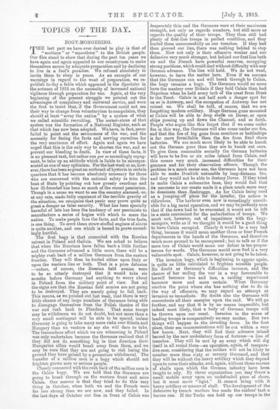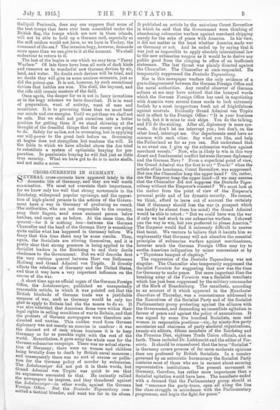TOPICS OF THE DAY.
BOGY-MONGERING. THE last part we have ever desired to play is that of " soothers " or " smoothers " to the British people. Our files stand to show that during the past ten years we have again and again appealed to our countrymen to make themselves secure by adequate preparation and by declining to live in a fool's paradise. We refused absolutely to invite them to sleep in peace. As an example of our -warnings in regard to the want of preparation, we re- publish to-day a fable which appeared in the Spectator in the autumn of 1912 on the necessity of increased national vigilance through preparation for war. Again, at the very beginning of the present struggle we pointed out the advantages of compulsory and universal service, and were the first to insist that, if the Government could not see their way to change from voluntaryism to compulsion, they should at least "array the nation" by a system of what we called scientific recruiting. The corner-stone of that system was the formation of a National Register, such as that which has now been adopted. We have, in fact, never failed to point out the seriousness of the war, and the necessity for facing the facts and nerving ourselves for the very maximum of effort. Again and again we have urged that this is the only way to shorten the war, and so prevent our bleeding to death. In view of these facts, it is no pleasant task, but rather one per se exceedingly repug- nant, to take up an attitude which is liable to be misrepre- sented as one of easy optimism. For the last week or so, how- ever,there has been so great an outbreak of hysteria in certain quarters that it has become absolutely necessary for those who are concerned with the national safety to trim the boat of State by pointing out how grossly overdone and how ill-founded has been so much of the recent pessimism. Though in a sense we want to see the country alarmed, or, at any rate, made fully cognisant of the terrible gravity of the situation, we recognize that panic may prove quite as great a, danger as false security. What has been specially harmful of late has been the tendency of our pessimists to manufacture a series of bogies with which to scare the nation. To make people face the facts, and the true facts, is one thing. To erect these straw-stuffed engines of alarm is quite another, and one which is bound to prove exceed- ingly hurtful. The first bogy is that connected with the Russian retreat in Poland and Galicia. We are asked to believe that when the Russians have fallen back a little further and the Germans advanced a, little more, there will be a mighty rush back of a million Germans from the eastern frontier. They will then be hurled either upon Italy or upon the western line or both. That is a pure delusion —unless, of course, the Russian field armies were to be so utterly destroyed that it would take six months before Germany had anything to worry about in Poland from the military point of view. But all the signs are that the Russian field armies are not going to be destroyed. They are merely going to fall back. This means, as we pointed out last week, that there is very little chance of any large numbers of Germans being able to disengage themselves from the Polish theatre of the war and rush back to Flanders. That some troops may be withdrawn we do not doubt, but not more than a very small contingent will be able to be spared, unless Germany is going to take many more risks over Silesia. and Hungary than we venture to say she will dare to take. The tremendous effort which we are witnessing in Poland was only undertaken because the Germans realized that if they did not do something big in that direction their Hungarian allies would break away from them, and we may be sure that they are not going to risk losing the ground they have gained by a premature withdrawal. The transfer of a million men is a bogy which should not frighten grown men or serious people. Closely connected with the rush back of the million men is the Calais bogy. We are told that the Germans are going to break through on the western front and seize Calais. Our answer is that they tried to do this very thing in October, when both we and the French were far less strong than we are now, and they failed. In the last days of October our line in front of Calais was desperately thin and the Germans were at their maximum strength, not only as regards numbers, but still more as' regards the quality of their troops. They thou still had plenty of first-line troops in perfect condition, and they hurled them unsuccessfully on our trenches. If they bad then pierced our line, there was nothing behind to stop them. Now not only is their offensive weaker and our defensive very much stronger, but behind our first line both we and the French have powerful reserves, occupying strong positions, which could deal without difficulty with any German advance. The line will hold. We do not want, however, to leave the matter here. Even if we assume that the Germans can and will break through to Calais, the bogy remains a bogy. The Germans would no more have the mastery over Britain if they held Calais than had Napoleon when he held every inch of the coast from Brest to the Texel. Calais is not half such a danger spot for us as is Antwerp, and the occupation of Antwerp has not ruined us. We shall be told, of course, that we are forgetting modern artillery. Huge German guns mounted at Calais will be able to drop sheik; on Dover, or upon ships passing up and down the Channel, and so forth. People who argue like this forget that if we come under fire in this way, the Germans will also come under our fire, and that the fire of big guns from monitors or battleships is far more formidable than the fire from fixed shore batteries. We are much more likely to be able to knock out the German guns than they are to knock out ours. To give them reasonable security the German batteries will have to be five or six miles inland from Calais, and this means very much increased difficulties for their gunners and for their observation officers. Though the problem is a, much easier one, the Germans have not been able to make Dunkirk untenable by long-distance fire, and they would not be able to destroy Dover. If they tried to make Calais a, submarine base, they would find that its nearness to our coasts made it a place much more easy to dominate than Zeebrugge. As for Calais being used as a jumping-off place for the invader, the notion is ridiculous. The harbour even now is exceedingly unsuit- able for a big naval operation, and we may be perfectly sure that if the town had to be evacuated it would not be left in a. state convenient for the embarkation of troops. We must not, however, out of impatience with the bogy- mongers, write as if we thought it would be a good thing to have Calais occupied. Clearly it would be a very bad thing, because it would mean another three or four French departments in the hands of the Germans, and therefore much more ground to be reconquered ; but to talk as if the mere loss of Calais would mean our defeat is too prepos- terous for words. The Germans would soon find it a very vulnerable spot. Calais, however, is not going to be taken.
The invasion bogy, which is beginning to appear again, is quite as little calculated to frighten sensible people. No doubt as Germany's difficulties increase, and the chance of her ending the war in a way favourable to herself becomes less and less, a raiding experiment becomes more and more certain. When Germany reaches the point where she has nothing else to do in the way of offensive, we may regard an attempt at invasion as immediate. No doubt also the Germans wilt concentrate all their energies upon the raid. We will go further, and say that it is by no means impossible, but indeed most likely, that a body of German troops will be thrown upon our coast. Invasion in the sense of landing troops is comparatively an easy matter. But two things will happen to the invading force. In the first place, their sea communications will be cut within a very few hours. Next, they will find their advance inland barred by the new ambulatory form of fortress—a line of trenches. They will be met by an army which wilt dig itself in all round them—an operation, again, of compara- tive ease, considering that the raiders will not be likely to number more than sixty or seventy thousand, and that they will be without the heavy artillery which they depend "Tonto cover their attacks, and, again, 'without those masses of shells upon which the German infantry have been taught to rely. By clever organization you may throw a small mobile army upon an undefended piece of shore, but it must move " light." It -cannot bring with it heavy artillery or masses of shell. The development of the defensive by trench warfare has made the raiders' task a barren one, If the Turks can hold up our troops in the Gallipoli Peninsula, does any one suppose that some of the best troops that have over been assembled. under the British flag, the troops which are now in these islands, will not be able to hold up a German raid, especially as the said raiders would not have, as we have in Turkey, the command of the sea ? The invasion bogy, however, demands more space than we can give to it at the moment. We shall endeavour to return to it.
The last of the bogies is one which we may term " Fancy Warfare." Of late there have been all sorts of dark hints and rumours as to wonderful new German devices by air, land, and water. No doubt such devices will be tried, and no doubt they will give us some anxious moments, just as did the poison-gas. It is not, however, by such sensational devices that battles are won. The shell, the bayonet, and the rifle still remain masters of the field.
Once again, the danger for us is not in fancy inventions or in the bogy schemes we have described. It is in want of preparation, want of activity, want of men and munitions. It is to procuring these that we must bend our minds and our energies. Until we get them we shall not be safe. But we shall not put ourselves into a better position for getting there if we stand shivering at the thought of the dreadful things that the enemy are going to do. Safety for us lies, not in screaming, but in applying our will-power to the great task before us. Screaming at bogies does not strengthen but weakens the will. In the fable to which we have alluded above the Ass tried to substitute a system of optimistic braying for pre- paration. In pessimistic braying he will find just as little true security. What we have got to do is to make aliens, and not make a noise.











































 Previous page
Previous page